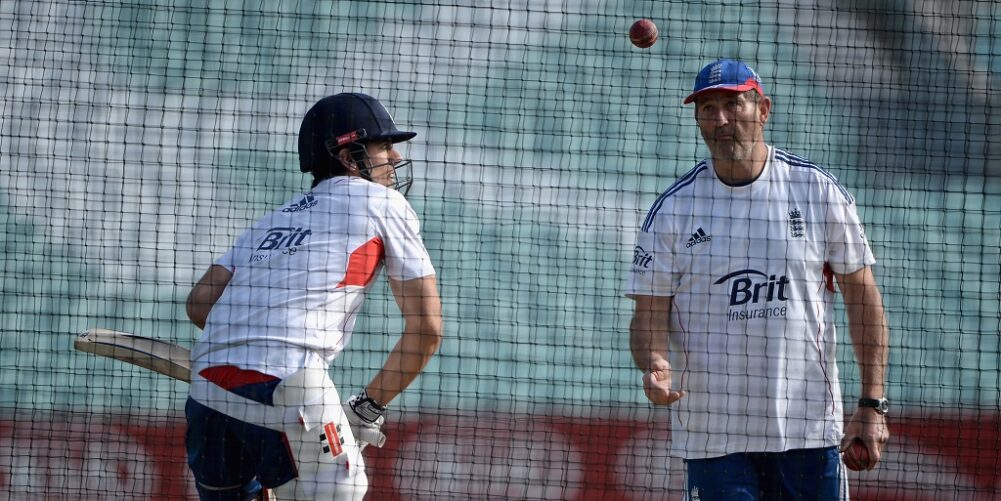(Photo: Getty Images)
By Derek Pringle
Pride and the hunger for further achievement will decide how much longer Alastair Cook prolongs his Test career, that and how he copes with Pakistan’s left-arm pace bowlers, Mohammad Amir and Rahat Ali.
Cook has a mountain of credit with England to assure him of starting the summer against Pakistan, following a patchy 18 months. Whether he can turn that into the kind of late flowering Graham Gooch enjoyed during his Test career, depends on his desire for continuing to get difficult runs; nothing in the Cook canon having come easy since bowlers discovered it was best to pitch the ball up to him.
To succeed he will need to defy what many see as the ominous trend of decline. Since making 130 against India at Rajkot in November 2016, he has played 34 Test innings of which two have been double hundreds and only three have exceeded fifty. Two almighty feasts amid famine.
If there is a consistency over that period, it is in the scores below 20 he has made, which number 19. At no other stage of his 154-Test career has he experienced a run like that.
Opening batsmen are prone to feast and famine more than other batsmen as they face the new ball, but by Cook’s high standards this is an extended slump which for most players would prove terminal. Yet, Cook has special qualities of determination that set him apart from his peers and if anyone can overturn a downward slide it is him.
It will be a challenge, though, starting with Pakistan, England’s initial opponents in a summer that also sees India, under their determined captain, Virat Kohli, tour the land.
Pakistan’s record here since 1990 has not been that bad, losing 10 Tests and winning eight. Opening bowlers, Amir and Rahat, will certainly pose the same questions of Cook that the left-arm Trent Boult did in New Zealand recently. In four Tests innings there, Cook fell cheaply to Boult on each occasion, his aggregate of 23 runs a nadir in an otherwise distinguished career.

Amir, in particular, is a world-class bowler who will be even better for having played in English conditions last season for Essex, Cook’s county. Like Boult, Amir will pitch the ball up and try to expose the faults in Cook’s footwork, the Achilles heel throughout his career.
The timing of his footwork is the main fragility Cook possesses, his game craft and the assessment of conditions, and the shots dictated by them, being sounder than most. If he moves his front foot too early, the usual fault, it can draw him into following the ball and playing away from his body, something all bowlers want him to do and which Boult has recently succeeded in achieving better than most.
It is not as if Cook is unaware of this and he has worked for several years with coach Gary Palmer, a former Somerset player, to rectify it. Palmer’s method, which uses two bowling machines, is based on angles and how batsmen set up to combat them. Yet, it may be time to consider new ideas if he is to prolong his England career like Gooch, his one-time mentor.
I remember Gooch saying to me during the 1987 World Cup in India and Pakistan, after a fallow season which had led to him being overlooked for England’s home series, that his eyes were going and that he couldn’t see himself playing for much longer.
History debunked that theory and he had his best years thereafter. Yet, it was sorting out his footwork and also finding the determination to improve, rather than simply maintaining what he’d got, which enabled him to become the batsman that went on to play another 59 Tests and score another 5,154 runs, including his 333 at Lord’s.
Cook is hewn from similar rock as Gooch, though whether he is completely sold on the fact that he still needs to take his game forward rather than simply preserve what he has (and you could understand if he was reluctant having scored over 12,000 Test runs) is not known.
What is known, is that he appears to be under pressure to make runs and big ones at that. Perhaps he shouldn’t be as his record suggests he is still the best England have. In any case, it is not as if there are openers of great pedigree, and that all-important quality of making ‘daddy hundreds’, bashing down the selectors’ door at present.
The modern way is for incessant change, though, irrespective of whether there is something better or even of similar quality to replace the status quo. Cook knows this and has admitted that scoring runs is the only surefire way for him to stay in the Test side.
He is 33 and could play for another two to three years should he overcome current frailties such as his footwork against the full-pitched ball. For that to happen he needs to work on two drives, the front foot one and the internal one that will help take him forward to improve as a batsman.
Most crucially, he has to make sure everything, especially his footwork, is tickity-boo the moment he takes guard. Plenty of batsmen can get their feet moving once they have spent time at the crease, though good bowlers like Amir will send you back pronto if there are malfunctions early on.
Cook was at crisis point against Pakistan before in 2010 and he came through with a hundred at the Oval. Although that score came later in the year when pitches were flatter, he usually delivers when under pressure.
As such, it will be no surprise to those who have watched him over the past dozen years if he does so again now and enjoys a second coming just like his boyhood hero Gooch.















